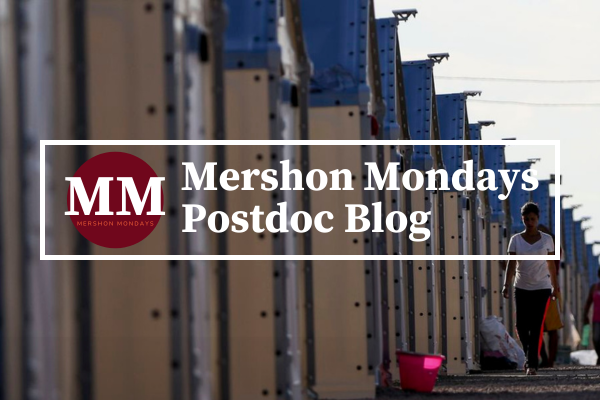Postdoc Blog: Venezuelan Migrants and Refugees Living in Brazil

We are thankful to have hosted José O. Pérez, our speaker at the September 23rd Mershon Monday event. José is a Ph.D. candidate in Political Science whose research interests cover Latin America. In particular, he focuses on migration and refugee policies, security studies, global health, and political violence in Brazil.
During his Mershon Monday talk, José shared complex and illuminating stories about the experiences of Venezuelan migrants and refugees living in Brazil. In the context of heightened vulnerability caused by the economic, social, and political crisis in Venezuela, over 425,000 people have crossed the border into Brazil from their Venezuelan homes. Through the program called Operação Acolhida (Operation Welcome), the Brazilian government, international organizations, and numerous NGOs have helped resettle over 125,000 people to over 1,026 municipalities across Brazil since 2017. By asking what “security” means to these people crossing borders in search of a better life for themselves and their families, José challenges the conventional top-down understanding of security, foregrounding their everyday encounters within refugee camps.
José employs a variety of interdisciplinary methods to highlight these lived experiences, ranging from ethnographic and airport observations to in-person and Zoom interviews, and media analysis. The stories he shared drew upon his extensive ethnographic fieldwork conducted in Brasília, Porto Alegre, Boa Vista, Manaus, and São Paulo through different visits over fourteen months between 2022 and 2024. His Brazilian interviewees included 82 (54.67%) females, 67 (44.67%) males, and 1 (0.66%) gender non-binary participants, with an average age of 30 years. Venezuelan interviewees included 81 (57.86%) females, 57 (40.71%) males, and 2 (1.43%) transgender participants, again with an average age of 30 years.

In the course of his research, José utilized both Spanish and Portuguese. Indeed, even though José is an outsider in the areas where he conducted research, his ability to speak Spanish and Portuguese enabled him to explore the vocabularies that Venezuelan migrants use to explain and remember their stories from home and in Brazil.
José’s approach shifts the analytical gaze to different levels, opening up new perspectives. Remarkably, his ethnographic methods enabled him to “see from below”–from inside the refugee camps, revealing the complex challenges migrants and refugees encounter in spaces frequently deemed safe by experts, policymakers, and outsiders. By listening to the stories of migrants and refugees and those involved in resettlement programs such as Operação Acolhida, José gained a clear understanding of their opportunities and predicaments through their voices and lived experiences.
José shared a powerful story from Niurka, a Venezuelan migrant in Minas Gerais, Brazil. Niurka conceptualized her migratory story as a “rupture” over what one leaves behind – the affections, lives, trajectories, everything – “to throw yourself into a new life starting from zero in a country you do not know anyone and with a language you oftentimes do not know, with laws that you do not know.” This story is a powerful example of what could be termed ethnographic “raptures”—moments where scholars write about people through their voices and centering their everyday conceptions of their lives, vulnerabilities, and resilience.
Another story that highlighted why people are willing to share with researchers was that of Sister Celeste, a nun in Manaus. When asked by José for any final remarks, she stated, “Maybe, when you can write this thesis, you can say that we don’t expect the United States government to do anything, but that you all, over there, could maybe be more welcoming to migrants.”
These stories, for José, reveal the raptures, everyday struggles, and insecurities of Venezuelan immigrants and refugees in their hopes and journeys to reconstruct their lives. Suas lutas continuam (their struggles continue), and we hope their stories will continue to be shared with broader audiences.
Mershon Monday Story by Postdoctoral Fellow Nicholas Nyachega, in collaboration with colleagues Julia Marino and Helen Murphey.
